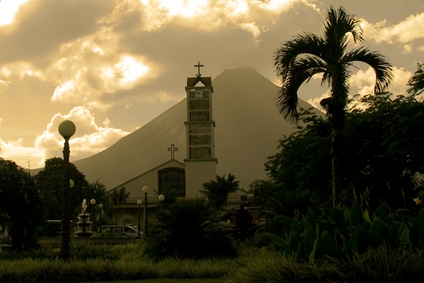 Costa Rica is known for being a traditional country with ties to its past. Costa Ricans believe in family and traditional values, especially when it comes to ceremonies such as births, marriage, death, and baptisms. These are attended by large family groups.
Costa Rica is known for being a traditional country with ties to its past. Costa Ricans believe in family and traditional values, especially when it comes to ceremonies such as births, marriage, death, and baptisms. These are attended by large family groups.
In addition, most live at home until they either get married or get a job, and it is rare that children move out – even to attend school. Hospitality appears to be the mantra of the country; includes friends, family, and even strangers. They also believe in men and women having traditional roles; although, there are some women who hold jobs that are considered by some to be a “man’s” job.
Costa Rica was a country colonized by the Spanish at one time in history; however, the Spaniards focused on riches in other lands and in this way Costa Rica was preserved. In the early 1800s, a rebellion occurred against the Spaniards and eventually coffee barons became the powerful few. In the mid 1800s, an exile named Jose Maria Figueres Ferrer helped to smother the civil unrest that had erupted within the country. He eventually went on to rule Costa Rica and provided many civil rights to his people.
Language in Costa Rica
Spain has been a big influence in the culture of Costa Rica, with the main spoken language being Spanish. Most Costa Rican people are of Spanish ancestry with a small percentage being German, Dutch, French, Chinese, and Italian. English, Creole, and some indigenous languages are also spoken in Costa Rica.
The many people that make up Costa Rica today is due to many immigrants from Europe using Costa Rica to get to other countries before the Panama Canal was built. As such, the ethnic groups represented in Costa Rica include the Danish, Portuguese, Belgians, Croatians, Turkish, and Russians just to name a few.
Religious Culture in Costa Rica

The most practiced religion in Costa Rica is Roman Catholic. This equates to about 77% of the population. There are other religions too as 16% are Protestant Christians, and 7% percent is divided between Buddhist, Jewish, Muslin, and Agnostics. As you can see, there is much variety.
The main religious events are Easter Week or Semana Santa in Spanish, Christmas Week, and the celebration of the Virgin of the Angels (August 2nd). There are others, but these stand out as they are huge affairs.
Education Tradition in Costa Rica
About 96% of the population of Costa Rica is considered to be literate, with six percent of the country’s gross national product spent on education. They have free public schooling up to the 12th grade, and attending school up to this level is mandatory for all of its citizens. Many citizens do go on to college as well. Today, you will find many Costa Ricans college educated.
Costa Rican Foods
Costa Rican food is a mix of cultures with foods coming from Spain, North and South America, and the Caribbean. Some of the national loved foods include Gallo pinto (a mix of black beans), rice, onions, garlic, salt, and cilantro. It is a dish that is loved and eaten usually for breakfast.
Costa Ricans also like to eat fried plantains, corn bread and tortillas, tamales, chicken, and other dishes. If you head over to the Caribbean side of Costa Rica, they enjoy foods cooked with coconut milk, tortillas with cheese, corn, or snacks made with corn.
All in all, Costa Rica is a beautiful country that many people enjoy visiting. It is a diverse culture rich with traditions coming from many people. More than four million people live in Costa Rica, and they all live and work together to blend all of these customs and traditions successfully.




